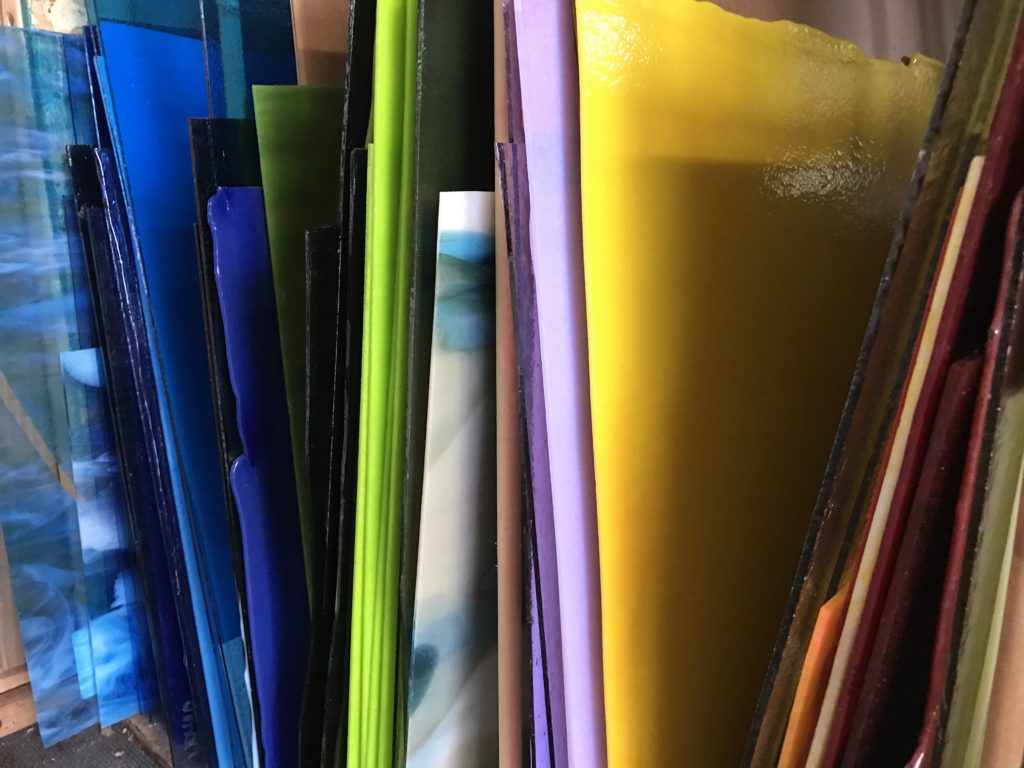Working in kiln glass, I have learned to trust my creativity and what I know about the science and physics of glass. From concept to creation, I am actively manipulating the fundamental materials of sheet glass, frit (ground glass) and rod/stringers. My work is then surrendered to the kiln where the magic of heat, often in excess of 1500 degrees, works to change the raw materials into art.
Living in the Indiana Dunes National Park (United States,) I have access to natural landscapes that includes miles of beach along the southern shore of Lake Michigan. From sand dunes to lake shore, marsh to areas populated with trees, there is nature all around me. There is the fierceness of the winter winds across the Lake Michigan and the gentle breezes of summer. This nature, in all its forms, has the ability to bring about a calm serenity within me. I strive to reference that sense of energy, beauty and calm in the pieces I create.
Central to my work is an understanding of the physics of glass, what it can and cannot do, what reactions I can expect as the variable of heat changes, and how glass flows when enough heat is applied. The raw materials for my art are combinations of large sheets of clear or colored glass, glass rods or stringers, and crushed or powdered glass. I combine and place these raw materials to create a piece that tells a story, evokes a feeling, and pleases the eye.
For my “Peace on Earth” and “Silent Night” Collections my technique is similar to the art of dry painting (sand painting) practiced by Native Americans, Tibetan Monks, and Aboriginal Peoples. Instead of sand, however, I use mixtures of powdered glass and I work in reverse. My main material is frit. Using glass powder (frit), the details and the focal images are laid down on a piece of clear glass first. Each added layer fleshes out the scene but covers the previous layer from view. So in some ways, I am working blind, not able to see what I did in layers before. Whether working from bottom up or top down, working in glass is challenging. Once high heat is applied the colors change and react with one another. After all the layers of glass powder have been applied, the piece is heated in a kiln to approximately 1500 degrees. Depending on what a piece will become, whether it be a bowl, a sculpture, or a narrative piece, one or two more trips in the kiln are required.

Towards the end of 2018, Alan Spaeth (R&S Marching Arts) and I began talking about creating clothing based on my glass designs. Our intent was to create one of a kind, unique pieces that were more than clothing. We wanted to create Art to Wear. We spent some months looking at clothing and coming up with silhouettes that were easy and beautiful to wear. Alan and Julia manipulated images of my glass designs and then used dye sublimation to dye chiffon, tricot jersey, and Italian Lycra materials. The outcome was several one of a kind Art to Wear pieces debuted in a joint exhibit at the Depot Museum and Art Gallery.
“Brown's exploration of rhythmical patterns in glass offers a sophisticated, controlled interpretation in transparent movement. Each piece is well conceived, with the execution skillfully recognized.”
Inquire about items, commissions, or availability for galleries. Or just ask a general question!
Address: Beverly Shores, Indiana
Mobile: 219.241.6444
Email: dr_caryn@comcast.net